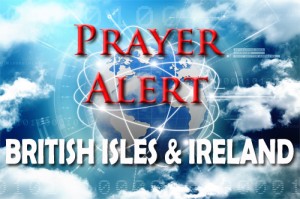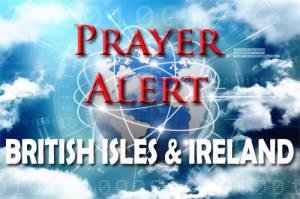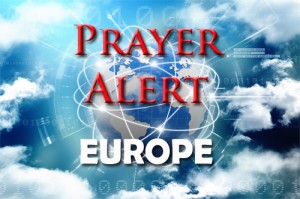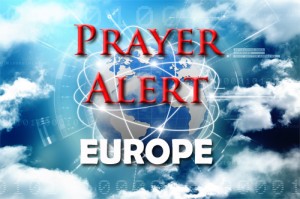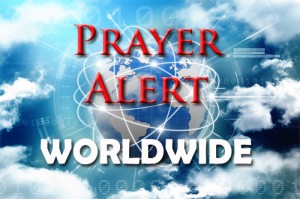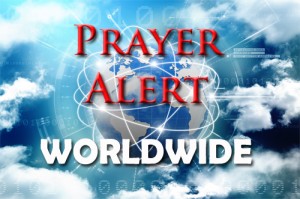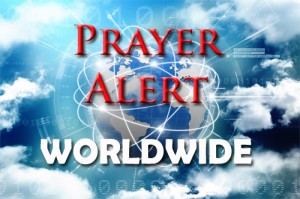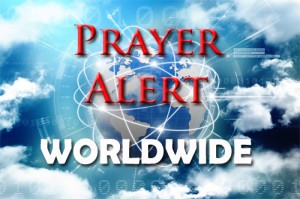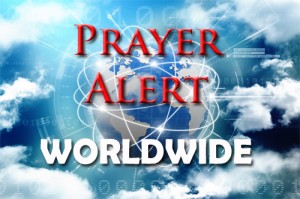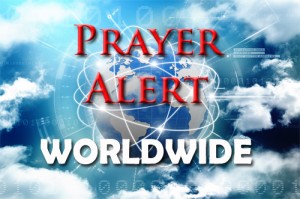
David Fletcher
David Fletcher is Prayer Alert’s Editor.
He is part of a voluntary team who research, proof-read and publish Prayer Alert each week.
If you would like to make a donation towards our running costs, please click here.
A migrant charity took over Parliament Square for the day earlier this week with a 'life-jacket graveyard'. Around 2,500 life-jackets were laid out across the site usually reserved for military memorials in an all-day protest urging the UK to do more to help those fleeing war-torn countries by giving them a home here. It was organised by the International Rescue Commission, whose president is David Miliband. However some criticised the 'misjudged' display, saying it will encourage more people to risk their lives in dangerous crossings to Europe. It came as a UN migration summit began in New York, with 193 countries approving a new document aimed at providing a more 'humane and co-ordinated' response to the refugee crisis. Also, the BBC Radio 4 Today programme reported that many of the life-jackets, adult and child sizes, were fake, and would cause the wearer to drown not float.
An east Belfast initiative with ties to the UDA (Ulster Defence Association) paramilitary group is moving towards official recognition. A review by the Criminal Justice Inspection Northern Ireland found that the Resolve project is making a ‘useful contribution in a fragmented community’ while delivering value for a very small amount of money. It is believed to be the first such initiative linked to the paramilitary group. Run on an annual budget of just £37,000, it has only two staff members, supported by a small group of volunteers. Its main activities include mediating neighbourhood disputes and offering non-violent solutions, helping people under paramilitary threat, and tackling antisocial behaviour. A Police Service neighbourhood Inspector said that while he would be happy to refer cases to Resolve, he is unable to do so while it remains unaccredited.
This week, Hungary, which has during the past year come under pressure for its handling of Europe’s mass migration crisis, has become the first government to open an office specifically to address the persecution of Christians in the Middle East and Europe. ‘Today, Christianity has become the most persecuted religion, where four out of five people killed for religious reasons are Christians’ said Hungary’s Minister for Human Capacities, Zoltan Balog. 200 million Christians live in areas where they are discriminated against. The move sets a precedent on the international stage. It comes after Hungary’s right-wing conservative Prime Minister, Viktor Orban, drew criticism in the EU by saying Europe should focus on helping Christians, before helping millions of Islamic people coming into Europe. ‘If we really want to help, we should help where the real problem is. We should first help the Christian people before Islamic people’, Orban said.
Swedes need to give up their identity and integrate with migrants because ‘being Swedish needs to be about more than skin colour and place of birth’. In a new TV advert from Swedish charity organisation IM, Swedes are called on to create ‘Det nya landet’ (the new country). The English text from their website says, ‘There is no turning back. Sweden will never be what it was before. It is an understanding of what the world actually looks like – that Sweden is needed as a safe place for people who need refuge. Some yearn back to how it used to be. It’s okay to miss the past and talk about it – but we have to seek ways forward and find a way for everyone to live together. Because now we have a Europe and a Sweden that is what it is: in a state of change.’
Prime minister Benjamin Netanyahu is assessing the security situation ahead of the Tishrei holidays - Rosh Hashanah, Yom Kippur and Sukkot. He has increased police presence in the Old City and Temple Mount to prevent attempts to violate public order, increased watchfulness for PA Arab incitement on social networks, and established a response team to refute disinformation about Israeli policy about the Temple Mount (such as claiming the Jews are plotting to destroy the Al-Aqsa mosque). It appears that the wave of terror that the security personnel thought was behind them is back in full force. In just one day, 18 September, a 50-year-old policeman and a 30-year-old policewoman were stabbed near Jerusalem’s Flower Gate, an IDF officer was wounded inside the town of Efrat in a terror attack, and an Arab woman pulled out a knife on two IDF soldiers near the town of Itamar. See also:
Yesterday the UN said it was ready to resume the delivery of life-saving aid to Syria, days after an attack on a humanitarian convoy killed 20 people and triggered the suspension of much-needed relief operations. The UN Office for the Coordination of Humanitarian Affairs said, ‘The preparation for these convoys has now resumed, and we are ready to deliver aid to besieged and hard-to-reach areas as soon as possible. The UN continues to call for safe, unconditional, unimpeded and sustained access to all Syrians in need, wherever they are.’ However, today this hope now looks increasingly unlikely, following the collapse of talks between the USA and Russia and a resumption of the Syrian government’s attacks on Aleppo.
Pastor William Devlin of Infinity Bible Church in New York City gave $4,000 from his own pocket to buy weapons for the Christian militia fighting IS. He bought grenades, rocket-propelled grenade launchers, and AK-47 assault rifles for the Nineveh Plain Protection Units, saying that weapons are much needed by the Christian militia in their battle against terrorists. However, many believe this raises the serious issue of what forms of aid and intervention Western Christians should offer to help their Middle Eastern brothers and sisters. How we engage has wide repercussions and demands deep reflection. Although the US has provided training for weaponry, the American government has not supplied weapons. Meanwhile the Iraqi ministry of the interior revealed that security forces had seized four trucks carrying explosives in southern Baghdad. They had come from Syria and entered Baghdad in collusion with some local authorities, paying $13,000 per truck. See:
Last week, Jordan hosted the 11th General Assembly of the Middle East Council of Churches. Presidents of churches from Jordan, Iraq, Syria, Palestine, Cyprus, Lebanon, Egypt and Iran reflected on common challenges facing Christian communities in the region and met with King Abdullah who gave his support by saying, ‘Christians in the Arab world are an integral part of the Arab social fabric and protecting their rights is a duty of all.’ At the close of the three-day assembly, the leaders said how they appreciate the support of Muslim leaders in the region and value their combatting extremism. They asked for intervention to stop the war in Syria and to give support to the region’s refugees, and urged the speedy election of a president in Lebanon. In Lebanon, the constitution requires the president to be a Christian but the post has been vacant for over two years as the sides cannot agree on a candidate.
The European Organisation for Pakistani Minorities organised ‘Plight of Pakistani Minorities’ at the 33rd session of the UN Human Rights Council. International speakers came from the European Parliament, International Forum for Rights and Security and the Institute for Gilgit-Baltistan Studies. They expressed deep concern over growing intolerance in Pakistani society, aggravated by the actions of the Pakistan government. They believe the government and military should realise that their policy to sustain and use extremist elements in certain neighbourhoods to achieve their own ends will sooner or later not only destabilise Pakistan internally but also spread to other parts of the world. Pray that the international community will recognise and work towards resolving this crisis, which has not been adequately addressed in the past.
Thirty-two African heads of state are debating ‘Sustainable Development Goals’ at the UN. Some major concerns are: Chad - continues to fight Boko Haram. Malawi - respect for basic human rights as they open doors to refugees from neighbouring countries. Also millions need food assistance due to climate change. Tunisia - promoting security and human rights but needs support to improve its economy, emphasising Tunisia’s commitment to build a prosperous, united Africa. South Africa - developmental progress in line with the African Union’s agenda, also called for inclusive growth where countries put global interests ahead of national ones. Nigeria - anti-corruption stance and effects of the global downturn on the country, also pointed out that climate change effects are threatening livelihoods of 30 million people. Uganda - preventing discrimination based on religion, gender and political orientation. Ghana - Africa does not need sympathy or overseas aid, it needs a fair chance to trade with the rest of the world and amongst ourselves.

